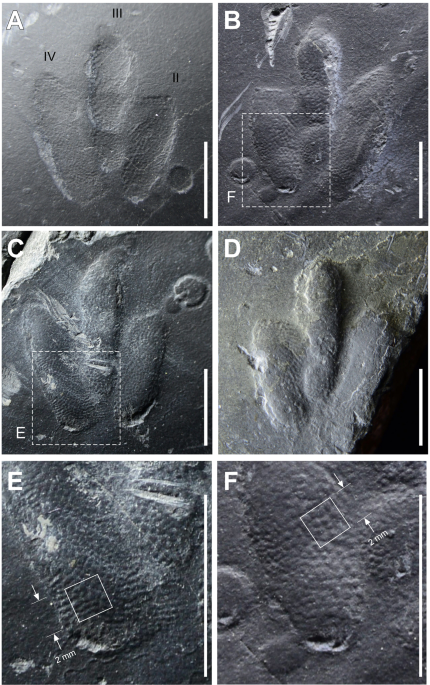Exquisitely-preserved, high-definition skin traces in diminutive theropod tracks from the Cretaceous of Korea
Kyung Soo Kim, Martin G. Lockley, Jong Deock Lim & Lida Xing
Scientific Reports volume 9, Article number: 2039 (2019)

Fig. 4
Abstract
Small theropod tracks, ichnogenus Minisauripus, from the Jinju Formation (Cretaceous) of Korea reveal exquisitely preserved skin texture impressions. This is the first report for any dinosaur of skin traces that cover entire footprints, and every footprint in a trackway. Special sedimentological conditions allowed footprint registration without smearing of skin texture patterns which consist of densely-packed, reticulate arrays of small (<0 .5="" also="" and="" as="" avian="" birds="" both="" casts="" china="" cretaceous="" different="" essentially="" foot="" for="" from="" had="" impressions="" is="" latter="" lower="" mm="" morphologies.="" nbsp="" of="" oldest="" polygons="" preserved="" quite="" replicas.="" report="" reported="" resembles="" skin="" span="" texture="" that="" the="" theropods="" this="" two="" which="">Minisauripus from Korea predating five reports from the Haman Formation of inferred Albian age. Minisauripus is now known from six Korean and three Chinese localities, all from the Lower Cretaceous. This gives a total sample of ~ 95 tracks representing ~ 54 trackways. With 80% of tracks <3 .0="" cm="" long="" nbsp="" span="">Minisauripus is pivotal in debates over whether small tracks represent small species, as the database suggests, or juveniles of large species.
Small theropod tracks, ichnogenus Minisauripus, from the Jinju Formation (Cretaceous) of Korea reveal exquisitely preserved skin texture impressions. This is the first report for any dinosaur of skin traces that cover entire footprints, and every footprint in a trackway. Special sedimentological conditions allowed footprint registration without smearing of skin texture patterns which consist of densely-packed, reticulate arrays of small (<0 .5="" also="" and="" as="" avian="" birds="" both="" casts="" china="" cretaceous="" different="" essentially="" foot="" for="" from="" had="" impressions="" is="" latter="" lower="" mm="" morphologies.="" nbsp="" of="" oldest="" polygons="" preserved="" quite="" replicas.="" report="" reported="" resembles="" skin="" span="" texture="" that="" the="" theropods="" this="" two="" which="">Minisauripus from Korea predating five reports from the Haman Formation of inferred Albian age. Minisauripus is now known from six Korean and three Chinese localities, all from the Lower Cretaceous. This gives a total sample of ~ 95 tracks representing ~ 54 trackways. With 80% of tracks <3 .0="" cm="" long="" nbsp="" span="">Minisauripus is pivotal in debates over whether small tracks represent small species, as the database suggests, or juveniles of large species.
Acknowledgements
We thank the School of Biological Sciences, the University of Queensland, Brisbane for help with statistical analyses done in Supplementary Information.
Author information
Affiliations
Department of Science Education, Chinju National University of Education, 3 Jinnyangho-ro 369beon-gil, Jinju-si, Gyeongnam, 52673, Korea
Kyung Soo Kim
Dinosaur Trackers Research Group, University of Colorado Denver, P.O. Box 173364, Denver, CO, 80217, USA
Martin G. Lockley
Cultural Heritage Administration, Government Complex-Daejeon, 189, Cheongsa-ro, Seo-gu, Daejon, 35208, Korea
Jong Deock Lim
School of the Earth Sciences and Resources, China University of Geosciences, Beijing, 100083, China
Lida Xing
Contributions
K.-S.K. found, collected and photographed specimens K.-S.K., M.G.L. and J.-D.L. examined field site, measured specimens and prepared manuscript and figures. L.X. examined comparative material and helped with bibliographic research and database organization.
Competing Interests
The authors declare no competing interests.
Corresponding author
Correspondence to Martin G. Lockley.
Rights and permissions
Creative Commons BY
Open Access This article is licensed under a Creative Commons Attribution 4.0 International License, which permits use, sharing, adaptation, distribution and reproduction in any medium or format, as long as you give appropriate credit to the original author(s) and the source, provide a link to the Creative Commons license, and indicate if changes were made. The images or other third party material in this article are included in the article’s Creative Commons license, unless indicated otherwise in a credit line to the material. If material is not included in the article’s Creative Commons license and your intended use is not permitted by statutory regulation or exceeds the permitted use, you will need to obtain permission directly from the copyright holder. To view a copy of this license, visit http://creativecommons.org/licenses/by/4.0/.
About this article
Publication history
Received 28 September 2018 Accepted 03 January 2019
Published 14 February 2019
DOI
Subjects Palaeontology Solid Earth sciences
FREE PDF GRATIS: Scientific Reports Sup. Info.


